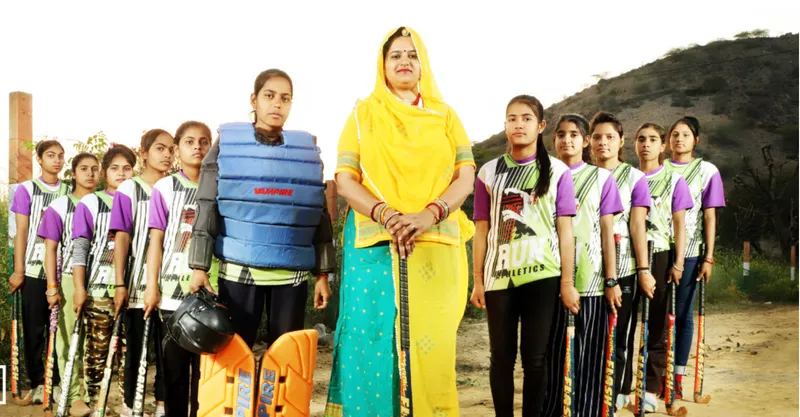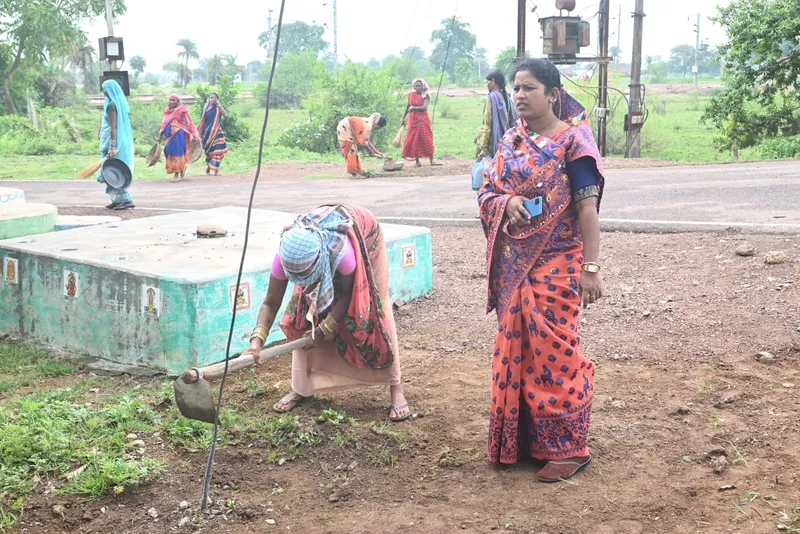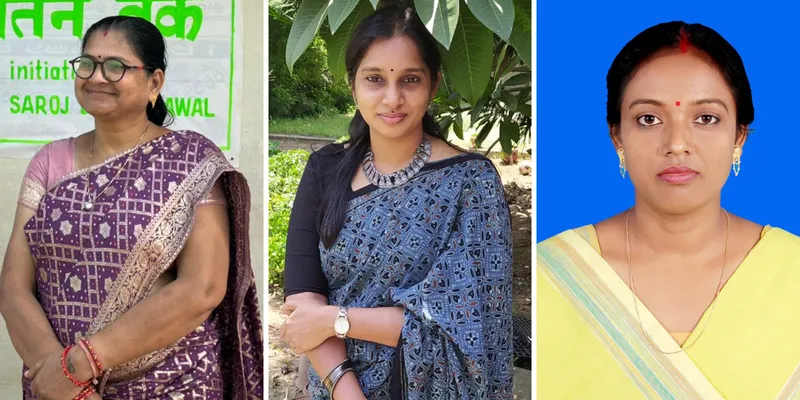How women in local governance are paving the way towards a Viksit Bharat
On National Panchayati Raj Day, we speak to women in local governance across different states to understand their contributions, successes, and challenges as they strive to bring growth and development to their panchayats.
In 2020, techie-turned entrepreneur Rekha Ramu contested for the position of panchayat president in Pandeswaram, a panchayat in Thiruvallur district, 30 km outside Chennai, on a general women’s seat and won.
Raised in agricultural families, Ramu and her husband VM Parthasarathy, who hails from Pandeswaram, had spent the last few years converting their lands into organic farms in their desire to follow a sustainable lifestyle.
Ramu, who previously worked in companies like HP and TCS, and her husband started Farmer & Co that works closely with farmers, farmer groups, and women self-help groups to bring organic produce to the market.
While working in Pandeswaram for extended periods of time, she understood the ground realities—rampant illegal sand mining, lack of infrastructure for higher education, and other local issues like land encroachment caught her attention. But she understood that if she had to work towards development, being in a position of power, especially in local governance, would help.
“In 2020, I decided to stand for elections and won. But unfortunately, the Covid-19 pandemic happened, and my work took off slowly,” Ramu tells HerStory.
In the next two years, she galvanised the community and brought changes in the primary education system, batting for a green village status for Pandeswaram, generating livelihood opportunities for the villagers while fighting corruption, cases of domestic violence, patriarchy, and cast discrimination in her panchayat.
With the 73rd Constitutional Amendment Act that reserves one-third of electoral seats for women in Panchayati Raj Institutions (PRIs), India has seen active participation from women in local governance. According to the Observer Research Foundation, more than 1.45 million women are shaping local decision-making. Currently, 20 states have 50% reservation for women in PRIs, and in Karnataka, they have exceeded this percentage.
On National Panchayati Raj Day, we explore the far-reaching contributions of women in local governance, while fighting patriarchy and changing mindsets along the way. These women are undeterred as they continue to change the face of their villages, one scheme at a time!
Going where no woman has gone before

The Hockeywali Sarpanch - Neeru Yadav
In Rajasthan’s Lambi Ahir in Jhunjhunu district, Neeru Yadav, who took over as sarpanch in 2020, is fondly called the ‘Hockeywali Sarpanch’ after she formed a girls hockey team in her village.
“There was no ground for the girls to play. We started playing on the ground of a private university nearby. I also decided to donate my salary for forming the team and appointing a coach to train the girls. Finally, we were able to have a ground of our own in the village,” she says. Many girls in the hockey team have now gone to play at district and state levels.
Besides a ‘bartan bank’ and infrastructure facilities like roads, rain water harvesting, and more, Yadav also launched a skill development programme for girls under the Pradhan Mantri Kaushal Vikas Yojana (PMKVY) Scheme, offering skills training for women. The panchayat partnered with the SBI to educate women about financial schemes under the Sukanya Samriddhi Yojana.
When the elderly and the disabled in Bhutkapada, a tribal hamlet in her panchayat , could not receive pension because they did not have proper roads connected to the main area, Saroj Devi Agrawal, the sarpanch of Bhaleswar block panchayat in Odisha’s Nuapada district, used a drone to disburse disability pensions and medicines.
The opening of the public health centre (PHC) has also enabled timely medical services, with a doctor and a nurse who visit patients and distribute medicines. Agrawal has also introduced an e-rickshaw, which will enable the elderly in the panchayat to travel to the bank, panchayat office, or the PHC.
In Risama panchayat in Chhattisgarh’s Durg district, Geeta Mahanand’s first focus after she became sarpanch in 2020, was on cleanliness. The BSc graduate ventured into social service after realising that only some semblance of power could shake things into action. She also started door-to-door garbage collection when she saw that people were disposing off their trash at the village square that set off a stench through the village.
“I proposed the introduction of a cleanliness tax that would force people to rethink before throwing garbage out into the streets. For this, I enlisted the help of women by raising awareness sessions on how improper disposal of garbage would affect the health of their families. Once they understood, things got better,” she says.
Another challenge was to reduce the dropout rates in the local school. Mahanand spoke to mothers and teachers to monitor the children, and slowly, the situation has improved, she says. To keep the children occupied during the summer holidays, she has facilitated classes in computers at a subsidised cost.
Alka Mahto is the mukhiya of Purabdih Village in Ramgarh District in Jharkhand. Her first task after joining office was to encourage people to build toilets in their homes.
“When I got married and came to the village, women had to wake up at the unearthly hour of 4 am to go to the fields to defecate. Women hardly had a voice in what happened in their homes or in the village. I wanted to change the way things were,” she says.
As a mukhiya, she is ensuring overall development of her village, visits schools and xi and educates people on various state and central government schemes available for them. Also, with her intervention and with help from various schemes, people are able to build toilets in their homes.
Battling diverse challenges

Geeta Mahanand
While Ramu won the elections, many asked why her husband or father-in-law were not coming to the panchayat office.
“In my first year, all the ward members were not able to earn any commission after I took over, and they approached my father-in-law and told him that they don’t want to work with me and asked him to visit the panchayat office instead. I told them I would complain if they continued in this vein,” she says.
People also questioned her decision-making abilities and tried to belittle her at every step. People who voted her to power implied that her position as panchayat president would mean that they would avail of “certain benefits”.
“Every suggestion of mine was met with, ‘this will not work’. It took me two-three years to establish that things were going to be under my control,” Ramu adds.
Despite opposition, she put a complete stop to sand mining in the panchayat, and has tied with Environmental Foundation of India to develop 220 acres of land into an eco-tourist spot that will generate livelihoods. Also, since 2020, there been no case of domestic violence reported in the panchayat.
For Mahanand too, it took a while to establish her authority.
“Men feel that a woman sarpanch is just a signing authority and will not use her brains much. Some of the members used foul language when I spoke of the cleanliness tax. But I persisted and converted people to the idea,” she says.
Agrawal was “gheraoed” along with other panchayat officials for almost 10 hours when she acted against the illegal sale of liquor in her village. But she is unfazed by the opposition; 20 years of being in local governance has helped her tide over different challenges with strength and fortitude.
Women in local governance

Saroj Devi Agrawal, Rekha Ramu and Alka Mahto
Jitendra Pandit, Associate Director of Governance at Transform Rural India, an organisation that transforms opportunities for localities and communities at a systemic level for impact at scale, believes that women in local governance ensure greater access for women from marginalised communities to frequent public institutions and forums to raise their voices.
“They promote participation and bring different developmental aspects, unlike their male counterparts who mainly focus on infrastructural issues. They also inspire other women to aspire to such leadership positions. It has been observed that other women comfortably discuss women-specific issues like the availability of sanitary pads, medicines, and health check-up equipment in gram sabha meetings in the presence of women leaders,” he says.
Mahanand echoes this sentiment. She adds that women are great at multi-tasking and “think the best for everyone, whether at home or outside.” She adds that they are active participants and it’s easy to reach out to them if there is any issue that needs to be addressed.
In her village, she had to work hard to bring women into the mainstream and called mahila sabhas to make women more comfortable to speak up.
“The change is happening, and I believe women have a great role to play in a nation’s growth and development when they become representatives of power,” she says.
The work will continue
After her present term is over, Mahanand wants to run for office again.
“I want to open a library, provide support to the elderly, and offer opportunities for livelihood generation. If I don’t win, it’s okay, I will continue working with the same seva bhaav (continue to serve others),” she says.
Livelihood generation, especially for women, also ranks high on Ramu’s list of things to do if elected for another term.
“We had to stop training sessions because of the pandemic. We hope to have these up and successfully running this year. We want to generate livelihood projects and are also looking at converting Pandeswaram into a Smart Green Village,” she says.
(The copy has been updated to correct a company name.)
Edited by Megha Reddy







